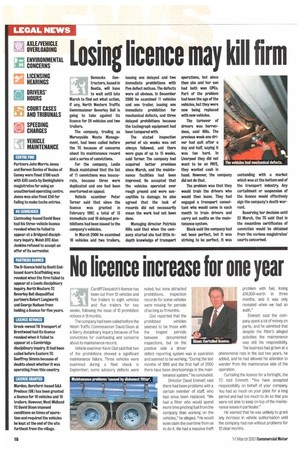Losing licence may kill firm
Page 18

If you've noticed an error in this article please click here to report it so we can fix it.
Bomacks Con , tractors, based in Bootle, will have • to wait until late March to find out what action, if any, North Western Traffic Commissioner Beverley Bell is going to take against its licence for 28 vehicles and two trailers.
The company, trading as Merseyside Waste Management, had been called before the IC because of concerns about its maintenance record and a series of convictions.
For the company, Leslie Black maintained that the list of 11 convictions was inaccurate, because three were duplicated and one had been overturned on appeal.
Vehicle examiner Peter Turner said that since the licence was granted in February 1997, a total of 13 immediate and 10 delayed prohibitions had been issued to the company's vehicles, In March 2000 he examined 10 vehldes and two trailers, issuing one delayed and two immediate prohibitions with five defect notices. The defects were all obvious. In December 2000 he examined 11 vehicles and one trailer, issuing one immediate prohibition for mechanical defects, and three delayed prohibitions because the tachograph equipment had been tampered with.
The stated inspection period of six weeks was not always followed, and there were gaps of up to 15 weeks, said Turner. The company had acquired better premises since March, and the maintenance facilities had been improved. He accepted that the vehicles operated over rough ground and were susceptible to damage; he also agreed that the lack of records did not necessarily mean the work had not been done.
Managing director Patricia Hills said that when the company started she had little indepth knowledge of transport operations, but since then she and her son had both won CPCs. Part of the problem had been the age of the vehicles, but they were now being replaced with new vehicles.
The turnover of drivers was horrendous, said Hilts. The previous week one driver had quit after a day and half, saying it was too hard. In Liverpool they did not want to be on PAYE, they wanted cash in hand. However, the company did not do that.
The problem was that they would train the drivers who would then leave. They had engaged a transport consultant who would come in each month to train drivers and carry out audits on the maintenance system.
Black said the company had not been perfect, but it was striving to be perfect. It was contending with a market which was at the bottom end of the transport industry. Any curtailment or suspension of the licence would effectively sign the company's death warrant.
Reserving her decision until 22 March, the IC said that in the meantime certificates of conviction would be obtained from the various magistrates' courts concerned.
































































































